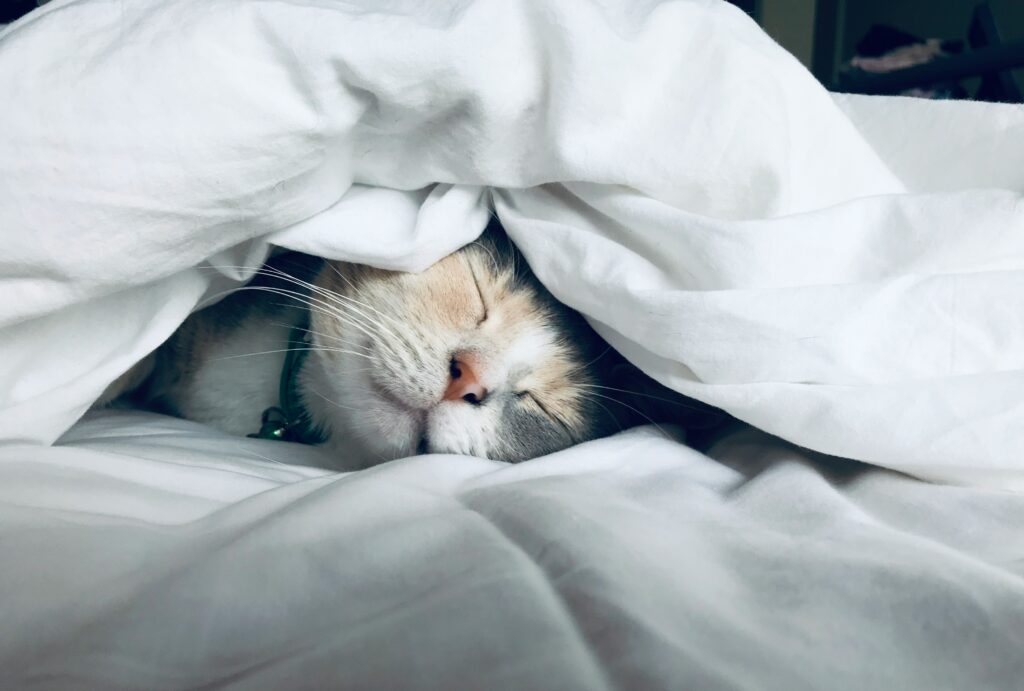Generally, the Japanese expression for saying “goodnight” is おやすみ (oyasumi). It’s pretty easy to use, too. Even if you’re a Japanese beginner or just starting to learn the language, saying this phrase can help you get closer — or at least friendlier — with your Japanese neighbor. It’s one of the four basic Japanese greetings, which include:
おはようございます!
Ohayou gozaimasu!
Good morning!
こんにちは!
Konnichiwa!
Good afternoon!
こんばんは!
Konbanwa!
Good evening!
You can make おやすみ (oyasumi) more formal by adding なさい (nasai). Together, it becomes おやすみなさい (oyasuminasai).
However, depending on the situation, it may be inappropriate or weird to use them sometimes. In this article, you will learn how to use the expression おやすみ in different situations, such as when going to bed and leaving to go home.

The greeting oyasumi (おやすみ) stems from the Japanese verb yasumu (休む), which actually has a lot of meanings: to be absent, to take a day off, to rest, to have a break, to go to bed or to rest. Contextually, the word isn’t just used to say “good night” or “have a good rest” to someone.
Let’s take a look at the two scenarios below.
本日お店はお休みさせていただきます。
Honjitsu omise ha oyasumi sasete itadakimasu.
Please allow the store (us) to have a break today.
今日店長の休みの日だから、一緒に頑張りましょうか。
Kyou tenchou no yasumi no hi da kara, issho ni ganbarimashouka.
Today is the manager’s holiday, so let’s work hard together.
Notice the different translation from the original oyasumi (おやすみ)? That’s because, in the Japanese language, the word yasumu (休む) is used to indicate someone taking a time off or an absence. You’ll notice this being used in a lot of Japanese work environments, when an employee, business, store or company may request a day off.
Notice the ‘o’ in oyasumi (おやすみ)? It doesn’t actually change the meaning of the expression. Rather, think of it as an addition to make the entire phrase more polite. This is because the お (O) is one of the two Japanese honorific prefixes besides ご (Go) that can be added to some nouns or verbs to make a sentence more honorific.
This is one of the many ways you can make a formal sentence, otherwise known as teineigo (丁寧語), into keigo (敬語), which are words, phrases and conjugation in the Japanese language used in super-formal situations.
We’re not really diving into the complex world of keigo right now, as that one is for advanced Japanese learners. However, the general rule is that before a native Japanese word, you should place an お. The prefix お can be attached to a noun but can also be attached to a verb stem for the grammatical construction of keigo.
The original version of Oyasumi (おやすみ) is actually its longer form that we briefly brushed up on earlier: おやすみなさい (oyasuminasai).
Nasai is part of conjugation on that verb to make it do something else. You’ve probably heard of ~てください, which is used to make requests or commands, but it holds more sense of authority. The conjugation 〜なさい is a suffix that is used to make polite commands or directions.
To connect 〜なさい to a verb, you’ll need to use the stem form of the verb. To make it even more refined, you add the prefix お (O) before the verb.
お + Verb う+ なさい
There you have it: おやすみなさい is a very subtle, polite command to a say: “Please have a good rest!”
How to Use Oyasumi (おやすみ): When Someone is Going to Bed
Similar to you saying “goodnight” when your friend or someone close to you is going to bed, you can also say it to your friend when you are about to sleep.
For example, when you are on the phone with your friend, you can say:
そろそろ寝(ね)るね、おやすみ。
sorosoro nerune, oyasumi
I’m about to sleep, goodnight.
おやすみ。”
Oyasumi
Goodnight.
When your friend says “oyasumi” to you, you should also reply to your friend with “oyasumi“.
When wishing goodnight to someone who is superior to you, instead of saying “oyasumi”, you should use the more formal form “おやすみなさい”. Unless you are very close with them, do not use おやすみ (oyasumi) to someone superior to you as it may be considered impolite.
For example, when you are on a business trip with your supervisor, he is going to sleep.
A: 今日はちょっと疲れたから、先に寝るよ, おやすみ。
Kyouwa chotto tsukaretakara, sakini neruyo, oyasumi
I am going to sleep first because I’m a little bit tired today, goodnight.
B: はい, おやすみなさい!
Hai, oyasuminasai.
Sure, goodnight!

How to Use Oyasumi (おやすみ): When Leaving to Go Home Late at Night
Oyasumi can also be used when it is late at night and someone is leaving to go home.
For example, when you and your colleagues are on the last train, your friend is going before you. You can say:
今日は一日お疲れ様でした、おやすみなさい。”
Kyowa ichinichi otsukaresamadeshita, oyasuminasai
Thanks for your work today, good night.
It is rarely the case that some people may find”おやすみなさい” inappropriate to be said to a superior person. This is because, in the strict sense, “おやすみなさい(oyasuminasai)” does not belong to any type of the Japanese Keigo.
To avoid trouble, alternatives you can use one of the following:
お疲れ様でした
Otsukaresamadeshita.
Thank you for your hard work.
今日はありがとうございました
Kyou wa arigatougozaimashita.
They both means thank you for your hard work today.
Now that you have learned when and how to say goodnight in Japanese, do you know how to say good morning in Japanese?
Want to study Japanese with us?
What does oyasumi mean?
“Oyasumi” is a common Japanese phrase used to say “goodnight.” It’s a polite and casual way to bid someone farewell before sleep.
How to pronounce oyasumi?
The pronunciation of “Oyasumi” is approximately “oh-yah-soo-mee.”
When can I say oyasumi?
You can use “Oyasumi” in various situations, including:
- Saying goodbye to friends or family before bed.
- Ending a phone conversation with someone you know well.
- Leaving a workplace or gathering for the night.
Yes, there are a few other options:
“Goodnight” (グッドナイト): The English word “goodnight” is also used in Japanese, especially in informal settings.
“Oyasuminasai” (おやすみなさい): This is a more formal and respectful way to say “goodnight.”
Can I use oyasumi to my acquaintances or colleagues?
While using “Oyasumi” with acquaintances or colleagues is not uncommon, it’s generally best to avoid using it with strangers. In those situations, a simple “失礼します” (Shitsureishimasu, meaning “Excuse me”) is more appropriate.
Can I say oyasumi to my partner?
Absolutely! “Oyasumi” is a common way to say “goodnight” to a romantic partner. You can also add a personal touch by saying something like “Oyasumi, anata” (おやすみ、あなた), which means “Goodnight, my love.”
What is the different oyasumi and oyasuminasai?
Yes, there is a slight difference. “Oyasumi” is more casual, while “Oyasuminasai” is more formal and respectful.
